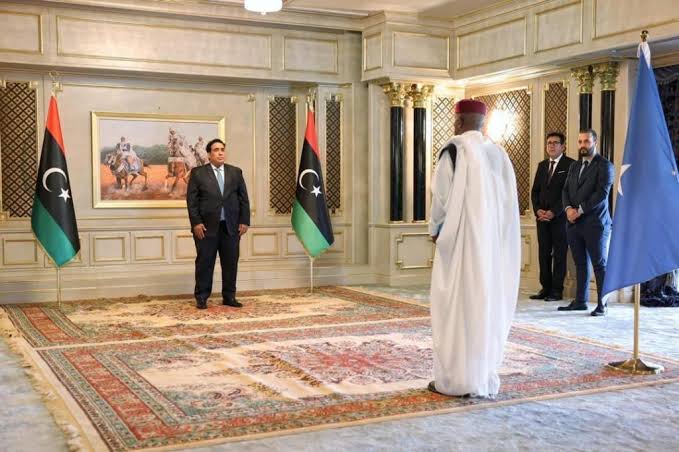Facebook Twitter (X) Instagram Somali Magazine - People's Magazine
Libya’s Acting Minister of Foreign Affairs in the Government of National Unity (GNU), Taher Al-Baour, and Somalia’s Minister of Foreign Affairs, Ahmed Moalim Fiqi, recently reaffirmed their commitment to enhanced diplomatic cooperation, emphasizing mutual interests in security, stability, and development across both nations and the broader African region.
During a phone call on Wednesday morning, Al-Baour extended his congratulations to Fiqi following Somalia’s successful election as a non-permanent member of the United Nations Security Council (UNSC) for the 2025-2027 term. Somalia’s election to this prestigious position marks a significant milestone in the country’s diplomatic progress, positioning it to influence global peace and security discussions while amplifying Africa’s voice on the international stage.
The conversation between the two foreign ministers centered on the importance of continuous collaboration and consultation on regional and international issues. They reaffirmed the need to strengthen bilateral ties and diplomatic coordination to address shared challenges, such as terrorism, regional conflict, and economic development.
Libya and Somalia have faced significant political and security challenges in recent years. Libya continues to navigate post-conflict reconstruction while working to stabilize its political landscape under the GNU. Similarly, Somalia remains engaged in efforts to combat extremist threats, particularly from the Al-Shabaab insurgency, while pursuing long-term development goals.
The two ministers emphasized that security cooperation between Libya and Somalia is essential for the broader stability of North and East Africa. As countries strategically positioned along critical maritime routes, both nations play vital roles in regional security dynamics, including counter-terrorism efforts and combating piracy. Enhanced collaboration could lead to joint strategies for intelligence sharing, capacity building, and coordinated military operations against extremist threats.
Development and economic growth were also central to the discussions. Both Al-Baour and Fiqi acknowledged the importance of supporting infrastructure development, expanding educational opportunities, and improving healthcare services. Strengthening economic ties could open new avenues for trade partnerships, investment opportunities, and job creation, which are crucial for long-term stability.
The Libyan Foreign Ministry’s statement following the call highlighted both nations’ shared vision for a peaceful and prosperous Africa, emphasizing the role of diplomatic engagement in conflict resolution and sustainable development. Libya has actively supported Somalia’s inclusion in the UNSC, reflecting a broader African push for greater representation in global decision-making bodies.
In the context of multilateral diplomacy, both Libya and Somalia have expressed a commitment to working collaboratively within the African Union (AU) framework to address continental challenges. These include advocating for peacebuilding initiatives, supporting democratic governance, and addressing humanitarian crises across the region.
This renewed cooperation also comes at a time when Libya is seeking to expand its diplomatic influence and partnerships beyond North Africa. Al-Baour’s outreach to Somalia aligns with Libya’s broader strategy of re-establishing itself as a key diplomatic player within the African continent. The GNU has recently strengthened ties with other nations, including Qatar and Egypt, while also exploring avenues for economic collaboration with countries like Morocco and Russia.
As Somalia prepares to take on its new role within the UNSC, Libya’s support signals a strengthening alliance aimed at fostering regional peace and shared development goals. Both countries have recognized that sustainable progress depends on a multifaceted approach that addresses political stability, economic empowerment, and effective conflict management.
The call between Al-Baour and Fiqi marks a significant step forward in regional diplomacy, emphasizing unity in the face of shared challenges. As both nations continue to rebuild and strengthen their institutions, this renewed diplomatic engagement could serve as a model for other African countries seeking collaboration based on mutual respect and common goals.

